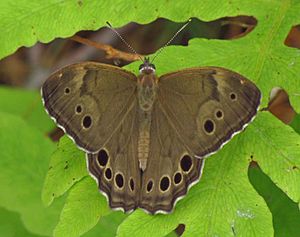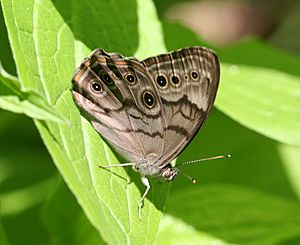Northern pearly-eye facts for kids
Quick facts for kids Northern pearly-eye |
|
|---|---|
 |
|
| Dorsal view | |
 |
|
| Ventral view | |
| Conservation status | |
| Scientific classification | |
| Kingdom: | |
| Phylum: | |
| Class: | |
| Order: | |
| Family: | |
| Genus: |
Enodia
|
| Species: |
E. anthedon
|
| Binomial name | |
| Enodia anthedon A. H. Clark, 1936
|
|
| Synonyms | |
|
|
The northern pearly-eye (scientific name: Enodia anthedon) is a type of butterfly found in North America. You can spot it from central Saskatchewan and eastern Nebraska all the way east to Nova Scotia. It also lives south to central Alabama and Mississippi.
Contents
Meet the Northern Pearly-Eye Butterfly
This butterfly has a wingspan of about 1 1/2 to 2 1/2 inches (43–67 mm). Its wings are mostly brown. The top side has dark spots that look like eyes, which helps it blend in or scare away predators. The underside of its wings is also brown.
What Northern Pearly-Eyes Eat
Adult Northern pearly-eye butterflies don't drink nectar from flowers like many other butterflies. Instead, they prefer to feed on different things. They might eat animal droppings (dung), fungi, or even dead animals (carrion). They also enjoy sap that oozes from trees like willows, poplars, and birches.
Life Cycle: From Larva to Butterfly
The young butterflies, called larvae or caterpillars, have a different diet. They munch on various kinds of grasses. Some of their favorite plants include whitegrass, Erianthus species, and Muhlenbergia species. They also eat bearded shortgrass, Uniola latifolia, bottlebrush grass, and false melic grass. In some northern areas, the larvae also feed on sedges.
These butterflies spend the winter as larvae. They will stay in this stage until the weather gets warmer. Then, they will continue their development into adult butterflies.
Different Types of Northern Pearly-Eyes
Just like some animals have different breeds or types, butterflies can have subspecies. These are slightly different groups within the same species. For the Northern pearly-eye, there are two known subspecies:
- Enodia anthedon anthedon
- Enodia anthedon borealis (found in Manitoba, Ontario, Quebec, and Maine)
Butterflies That Look Similar
Sometimes, different butterfly species can look very much alike. This can make it tricky to tell them apart! Here are a couple of butterflies that are often confused with the Northern pearly-eye:
- Appalachian brown (Satyrodes appalachia or Lethe appalachia)
- Eyed brown (Satyrodes eurydice or Lethe eurydice)
For more details, you can look up Lethe anthedon on Wikipedia.
 | Claudette Colvin |
 | Myrlie Evers-Williams |
 | Alberta Odell Jones |



